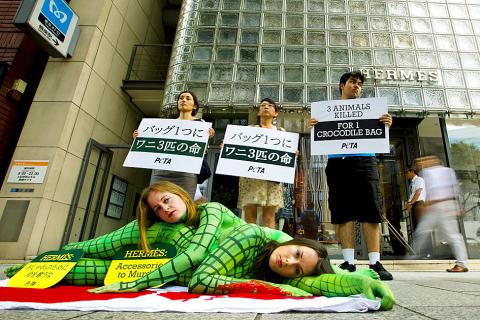British singer Jane Birkin has dropped a request to have her name taken off a Hermes handbag after the group reviewed its treatment of crocodiles, a company statement said on Friday.
“Following the heartfelt emotion expressed by Jane Birkin and her request for explanation, Hermes in agreement with her reiterates its firm commitment in the ethical treatment of crocodiles in its partner farms,” the luxury fashion house said.
It said the 68-year-old singer said she was “satisfied” by the measures taken by Hermes.

Photo: Reuters
Contacted by reporters, Birkin’s agent confirmed the news.
After Birkin learned of the “cruel” methods associated with the production of crocodile-skin bags, she asked the luxury manufacturer to take her name off the bag in late July.
The bag was designed for Birkin in 1984, after a chance meeting of the singer and the group’s then-president, Jean-Louis Dumas.
The bag has since become a celebrity favorite, beloved of Victoria Beckham, Kim Kardashian and characters in the Sex and the City television series, among others.
The crocodile version, which costs at least 33,000 euros (US$36,000), is one of Hermes’ best-known products.
People for the Ethical Treatment of Animals (PETA) released a video about the slaughter of crocodiles for the production of the famous bags, with reptiles allegedly “cruelly hacked” to death to produce a purse.
After Birkin announced her request to have her name removed, PETA said on its Web site: “On behalf of all kind souls in the world, we thank Ms Birkin for ending her association with Hermes.”

Semiconductor shares in China surged yesterday after Reuters reported the US had ordered chipmaking giant Taiwan Semiconductor Manufacturing Co (TSMC, 台積電) to halt shipments of advanced chips to Chinese customers, which investors believe could accelerate Beijing’s self-reliance efforts. TSMC yesterday started to suspend shipments of certain sophisticated chips to some Chinese clients after receiving a letter from the US Department of Commerce imposing export restrictions on those products, Reuters reported on Sunday, citing an unnamed source. The US imposed export restrictions on TSMC’s 7-nanometer or more advanced designs, Reuters reported. Investors figured that would encourage authorities to support China’s industry and bought shares

FLEXIBLE: Taiwan can develop its own ground station equipment, and has highly competitive manufacturers and suppliers with diversified production, the MOEA said The Ministry of Economic Affairs (MOEA) yesterday disputed reports that suppliers to US-based Space Exploration Technologies Corp (SpaceX) had been asked to move production out of Taiwan. Reuters had reported on Tuesday last week that Elon Musk-owned SpaceX had asked their manufacturers to produce outside of Taiwan given geopolitical risks and that at least one Taiwanese supplier had been pushed to relocate production to Vietnam. SpaceX’s requests place a renewed focus on the contentious relationship Musk has had with Taiwan, especially after he said last year that Taiwan is an “integral part” of China, sparking sharp criticism from Taiwanese authorities. The ministry said

US President Joe Biden’s administration is racing to complete CHIPS and Science Act agreements with companies such as Intel Corp and Samsung Electronics Co, aiming to shore up one of its signature initiatives before US president-elect Donald Trump enters the White House. The US Department of Commerce has allocated more than 90 percent of the US$39 billion in grants under the act, a landmark law enacted in 2022 designed to rebuild the domestic chip industry. However, the agency has only announced one binding agreement so far. The next two months would prove critical for more than 20 companies still in the process

CHANGING JAPAN: Nvidia-powered AI services over cellular networks ‘will result in an artificial intelligence grid that runs across Japan,’ Nvidia’s Jensen Huang said Softbank Group Corp would be the first to build a supercomputer with chips using Nvidia Corp’s new Blackwell design, a demonstration of the Japanese company’s ambitions to catch up on artificial intelligence (AI). The group’s telecom unit, Softbank Corp, plans to build Japan’s most powerful AI supercomputer to support local services, it said. That computer would be based on Nvidia’s DGX B200 product, which combines computer processors with so-called AI accelerator chips. A follow-up effort will feature Grace Blackwell, a more advanced version, the company said. The announcement indicates that Softbank Group, which until early 2019 owned 4.9 percent of Nvidia, has secured a